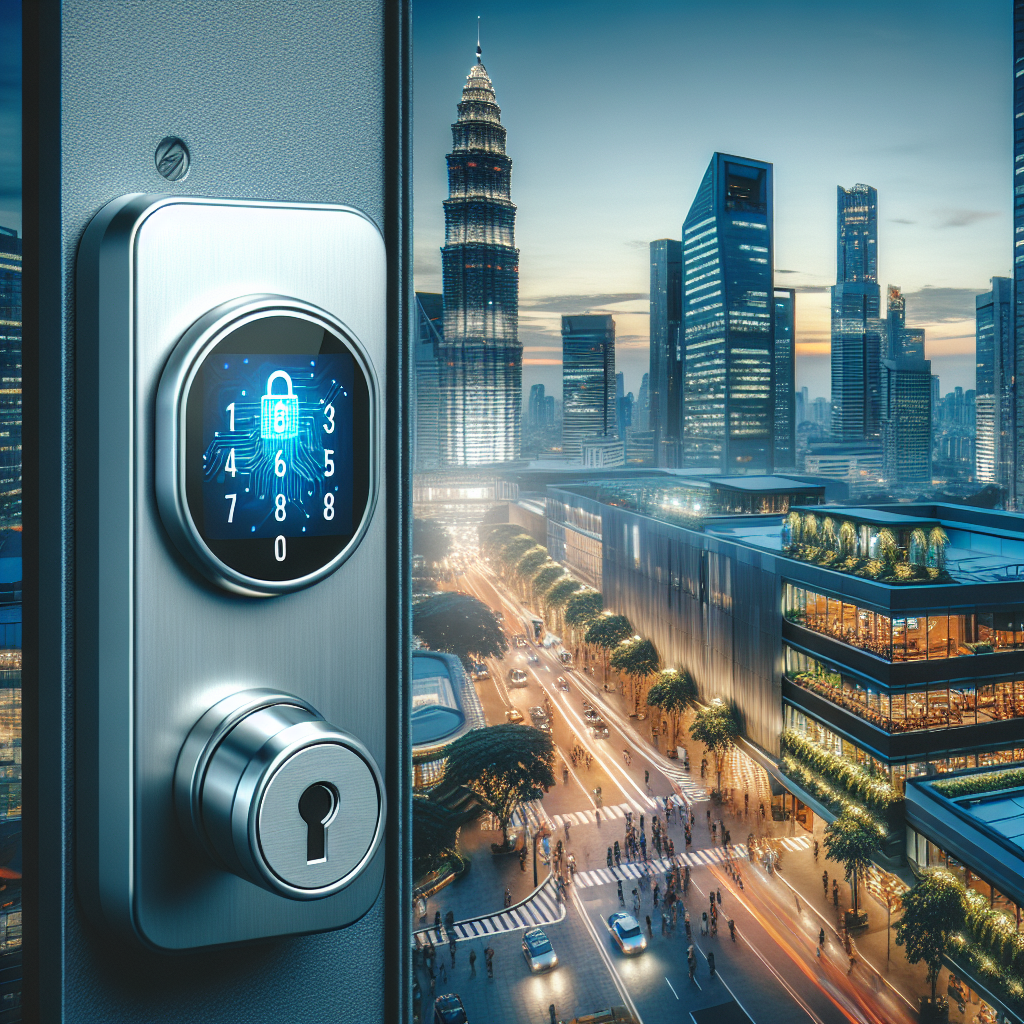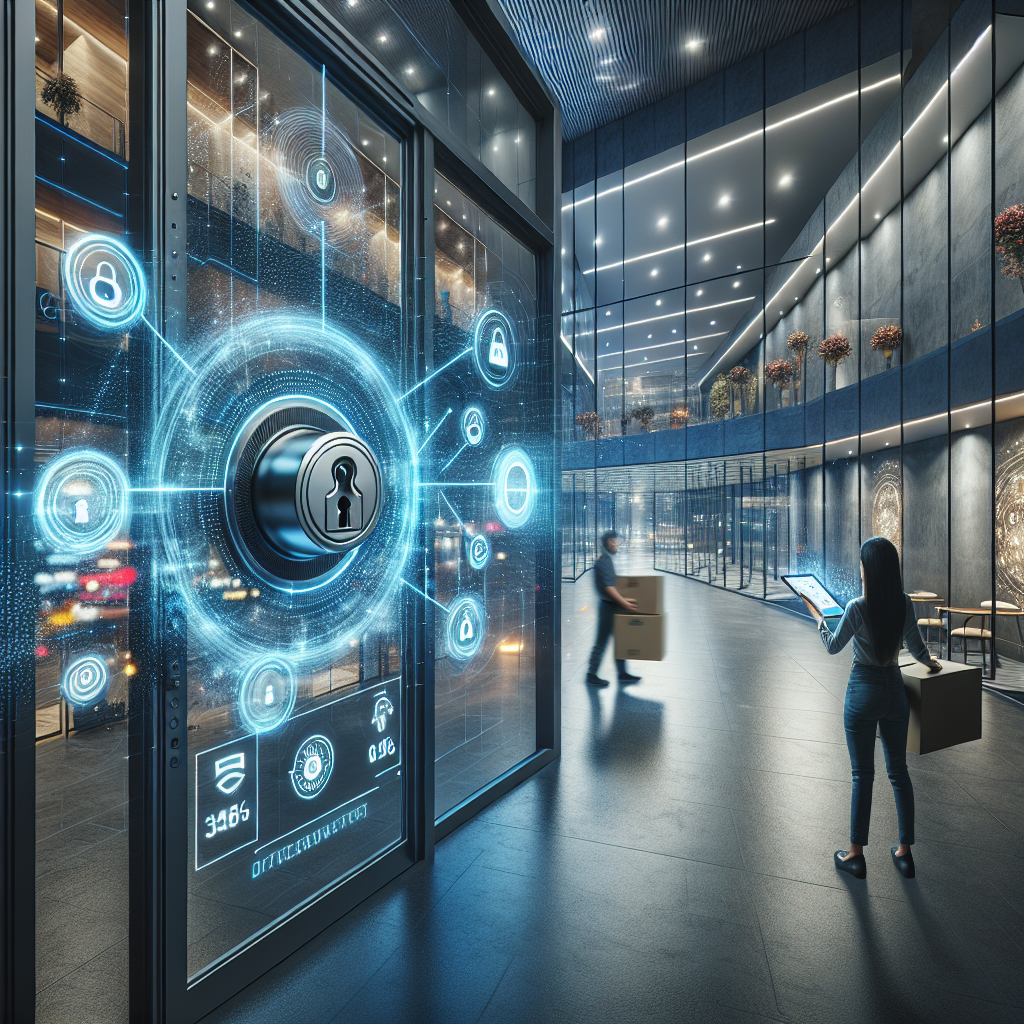Smart locks are revolutionizing security systems for commercial properties. These innovative devices offer advanced features such as keyless entry, remote access, and customizable access codes, making them an ideal choice for businesses seeking to enhance their security measures. In this comprehensive guide, we will delve into the numerous benefits that smart locks bring to commercial properties. From increased convenience and efficiency to improved access control and monitoring capabilities, smart locks are changing the way businesses safeguard their assets. Join us as we explore the exciting world of smart locks and discover how they can elevate the security of your commercial property.
Understanding Smart Lock Technology
Smart locks are innovative security devices that provide keyless entry to commercial properties through advanced technology integration. These locks offer a range of features that enhance security measures and streamline access control systems for businesses. Understanding the technology behind smart locks is essential for unlocking their full potential in commercial settings.
Definition of Smart Locks
Smart locks are electronic locks equipped with wireless technology that allows users to lock and unlock doors remotely using smartphones, key fobs, or biometric authentication. These locks eliminate the need for traditional keys and provide a higher level of security through encrypted communication protocols and multi-factor authentication methods.
How Smart Locks Work
Smart locks operate through a combination of hardware components, such as sensors, motors, and connectivity modules, and software applications that manage access permissions and user interactions. When a user sends a command to the smart lock, either through a mobile app or a designated access device, the lock’s mechanism activates to either secure or release the door latch.
Types of Smart Locks Suitable for Commercial Properties
-
Wi-Fi Enabled Smart Locks: These locks connect directly to a business’s Wi-Fi network, allowing remote access control and real-time monitoring of entry and exit events.
-
Bluetooth Smart Locks: Ideal for smaller commercial spaces, Bluetooth smart locks offer short-range connectivity for convenient keyless entry using smartphones or authorized devices.
-
Biometric Smart Locks: Incorporating fingerprint or facial recognition technology, biometric smart locks provide high-security access control for sensitive areas within commercial properties.
-
Smart Lock Systems: Integrated smart lock systems combine multiple locks into a centralized management platform, enabling administrators to oversee access rights, monitor security events, and generate activity reports for commercial premises.
Advantages of Implementing Smart Locks in Commercial Properties

Smart locks offer a myriad of benefits for commercial properties, revolutionizing the way security is managed and enhancing operational efficiency. Here are the key advantages of integrating smart locks into commercial settings:
-
Enhanced Security Features: Smart locks provide advanced security features that surpass traditional lock-and-key systems. These locks often utilize biometric authentication, keypad codes, or proximity sensors, making unauthorized access significantly more challenging. Additionally, some smart locks offer encryption technology, ensuring data transmission between devices is secure and protected from hacking attempts.
-
Remote Access and Monitoring Capabilities: One of the most significant advantages of smart locks is the ability to remotely control access to the property. Through a dedicated mobile app or web interface, property managers can grant or revoke access permissions in real-time, regardless of their physical location. This feature is particularly useful for granting access to contractors, employees, or deliveries outside of regular business hours, enhancing flexibility and eliminating the need for physical keys.
-
Integration with Other Smart Devices for Streamlined Operations: Smart locks can seamlessly integrate with other smart devices within the commercial property ecosystem, creating a connected network that streamlines operations. For instance, smart locks can be synchronized with security cameras, access control systems, and lighting controls to create a comprehensive security solution. This integration not only enhances overall security but also offers operational benefits such as energy efficiency and centralized management.
Factors to Consider When Choosing Smart Locks for Commercial Use
When selecting smart locks for commercial properties, there are several crucial factors that need to be taken into account to ensure optimal security and functionality:
-
Durability and Reliability: One of the primary considerations when choosing smart locks for commercial use is their durability and reliability. Commercial properties often experience high traffic and usage, so the selected smart locks must be able to withstand constant operation without compromising on security. Look for smart locks that are built with robust materials and have a proven track record of reliability to ensure they can withstand the demands of a commercial setting.
-
Compatibility with Existing Security Systems: Another essential factor to consider is the compatibility of the smart locks with the existing security systems in place at the commercial property. It is crucial that the smart locks seamlessly integrate with the current security infrastructure to ensure a cohesive and effective security setup. Compatibility issues can lead to vulnerabilities in the system, so thorough research and consultation with security experts may be necessary to ensure a smooth integration process.
-
Scalability for Future Needs: When investing in smart locks for commercial properties, it is important to consider the scalability of the system for future needs. As businesses grow and security requirements evolve, the smart locks should be able to accommodate these changes without the need for extensive modifications or replacements. Opt for smart lock solutions that offer scalability options such as the ability to add more access points or integrate additional features as needed to future-proof the security system.

Installation and Maintenance of Smart Lock Systems
Smart lock systems offer a modern and secure solution for commercial properties, enhancing access control and overall security measures. Understanding the installation and maintenance of these systems is crucial for ensuring they function optimally.
Professional Installation vs. DIY Options
When considering the installation of smart lock systems in commercial properties, the choice between professional installation and DIY options must be evaluated. Professional installation provides the advantage of expertise and ensures that the system is set up correctly from the start. This can help prevent potential issues and ensure that the smart locks are integrated seamlessly with existing security systems. On the other hand, some property owners may opt for a DIY approach to save on installation costs. However, DIY installation may lack the precision and technical knowledge that professionals can offer, potentially leading to complications or security vulnerabilities.
Regular Maintenance and Troubleshooting Tips
Maintaining smart lock systems in commercial properties is essential to prolong their lifespan and ensure consistent performance. Regular maintenance tasks may include:
- Checking and replacing batteries in the smart locks to prevent power failures.
- Cleaning the lock components to remove dirt or debris that could affect functionality.
- Updating software and firmware to address security vulnerabilities and improve system performance.
- Testing the smart locks regularly to identify any issues or malfunctions.
In addition to routine maintenance, having troubleshooting tips in place can help address common problems that may arise with smart lock systems. Property managers should familiarize themselves with troubleshooting procedures provided by the manufacturer and have a plan in case of lock malfunctions or connectivity issues.
Upgrading Smart Lock Systems for Optimal Performance
As technology advances, upgrading smart lock systems in commercial properties becomes a strategic investment in enhancing security measures. Upgrading to newer models or integrating additional features can offer benefits such as:
- Enhanced encryption protocols for improved data security.
- Integration with smart home automation systems for seamless access control.
- Advanced biometric authentication methods for enhanced security measures.
- Remote access capabilities for convenient monitoring and management of access permissions.

Property owners should consider upgrading their smart lock systems periodically to leverage the latest advancements in technology and strengthen overall security protocols.
Addressing Security Concerns and Misconceptions
Smart locks have revolutionized the way commercial properties manage access control, but there are still prevalent misconceptions and concerns surrounding their security features. It is crucial to address these issues to fully comprehend the benefits they offer in enhancing security protocols.
Myth-busting common misconceptions about smart locks
-
Vulnerability to hacking: One common misconception is that smart locks are more susceptible to hacking compared to traditional locks. However, reputable smart lock manufacturers implement robust encryption protocols and security measures to prevent unauthorized access. Regular software updates and adherence to best practices can mitigate the risk of hacking.
-
Reliability concerns: Some skeptics argue that smart locks may fail during emergencies or power outages. In reality, many smart locks come equipped with backup power sources such as batteries, ensuring continuous operation even in unforeseen circumstances. Additionally, most smart locks offer manual key override options for added reliability.
Ensuring data privacy and encryption protocols
-
Data encryption: Smart locks utilize advanced encryption algorithms to secure access credentials and communication between the lock and the central system. This encryption ensures that sensitive data remains protected from potential breaches or interception by malicious actors.
-
Privacy controls: Commercial properties can implement stringent privacy controls within smart lock systems to regulate access permissions and data sharing. By customizing user roles and access levels, businesses can maintain a high level of privacy and control over who can enter specific areas within the property.
Backup measures in case of system malfunctions
-
Redundancy protocols: To address concerns about system malfunctions, smart locks often incorporate redundancy protocols to minimize downtime. These protocols may include backup power sources, offline access options, and fail-safe mechanisms to ensure continuous operation even in the event of technical failures.
-
Remote monitoring and troubleshooting: Many smart lock systems offer remote monitoring capabilities, allowing property managers to diagnose and address issues promptly. By monitoring system health status and receiving real-time alerts, businesses can proactively resolve potential malfunctions before they impact security or operations.
In conclusion, addressing security concerns and misconceptions surrounding smart locks is essential for commercial properties to leverage the full benefits of these advanced access control systems. By debunking myths, ensuring robust data privacy measures, and implementing backup protocols, businesses can enhance their security posture and streamline access management processes.
Case Studies: Successful Implementation of Smart Locks in Commercial Settings
In a recent case study conducted by a leading security solutions provider, a large office building in a bustling metropolitan area implemented smart locks across its premises to enhance security measures. The results were overwhelmingly positive, showcasing the numerous benefits of incorporating smart lock technology in commercial properties. Here are some key details from the case study:
-
Enhanced Access Control: By utilizing smart locks with customizable access codes and remote locking/unlocking capabilities, the office building was able to streamline access control for employees, vendors, and visitors. This not only improved operational efficiency but also bolstered security by eliminating the need for physical keys that could be lost or duplicated.
-
Improved Monitoring and Reporting: The smart locks were integrated with a centralized monitoring system that provided real-time data on door activity, including entry and exit logs. This level of visibility allowed the property management team to track access patterns, identify potential security breaches, and generate comprehensive reports for audit purposes.
-
Cost Savings: Despite the initial investment in smart lock technology, the office building experienced significant cost savings in the long run. With reduced reliance on traditional lock-and-key systems, the property saved on expenses related to key replacement, rekeying, and locksmith services. Additionally, the remote access capabilities minimized the need for on-site security personnel, further reducing operational costs.
-
Seamless Integration with Existing Infrastructure: One of the key success factors of the smart lock implementation was its seamless integration with the building’s existing security infrastructure. The compatibility of the smart locks with access control systems, surveillance cameras, and alarm systems ensured a holistic approach to security management, creating a robust defense against unauthorized access and intrusions.
Overall, the case study demonstrated that smart locks offer a comprehensive solution for enhancing security, improving operational efficiency, and reducing costs in commercial properties. By leveraging the advantages of smart lock technology, businesses can create a secure and streamlined environment that meets the evolving needs of modern security challenges.
FAQs Exploring the Benefits of Smart Locks for Commercial Properties: A Comprehensive Guide
What are the main benefits of using smart locks for commercial properties?
Smart locks offer a wide range of benefits for commercial properties, including increased security, convenience, and control. With smart locks, property managers can easily monitor and control access to the property remotely, track who enters and exits the building, and quickly revoke access for employees or tenants who are no longer authorized to enter. Smart locks also eliminate the need for physical keys, reducing the risk of lost or stolen keys compromising the security of the property.
How do smart locks enhance security for commercial properties?
Smart locks provide advanced security features that traditional locks cannot match. With features like encryption, two-factor authentication, and integration with security systems, smart locks offer a higher level of protection against unauthorized access. In addition, some smart locks can send real-time notifications to property managers in the event of a security breach, allowing for immediate action to be taken to secure the property.
Can smart locks be easily integrated with existing security systems?
Yes, smart locks are designed to be easily integrated with existing security systems in commercial properties. Many smart lock manufacturers offer compatibility with popular security systems, allowing property managers to streamline their security measures and centralize control over access to the property. Integrating smart locks with existing security systems can provide a more comprehensive and efficient security solution for commercial properties.
Are smart locks compatible with different types of doors and entry points?
Yes, smart locks are available in a variety of styles and designs to accommodate different types of doors and entry points in commercial properties. From traditional door locks to electronic keypads and biometric scanners, there are smart lock options available to suit the specific needs of different entry points. Property managers can choose the type of smart lock that best fits the security requirements and aesthetic of their commercial property.